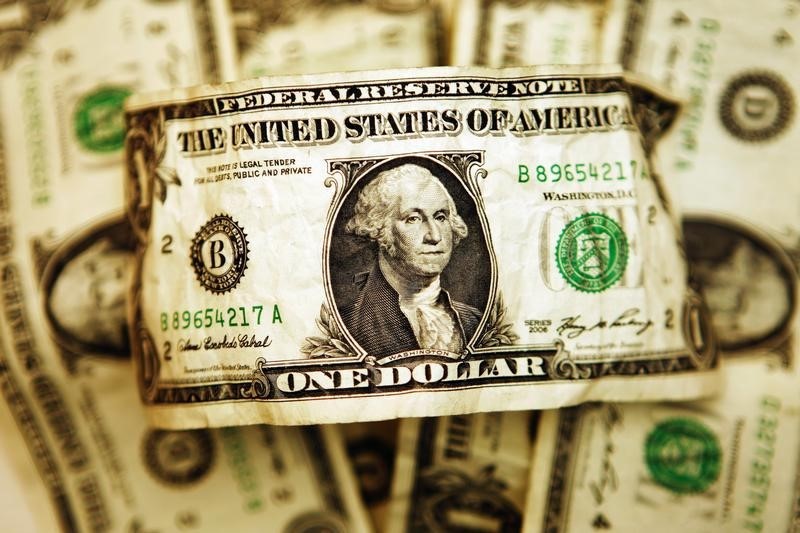Investing.com – US authorities’ move to seize Russian assets could add to recent efforts to diversify against the dollar, but according to Wells Fargo, the dollar will likely still be the global reserve currency for the foreseeable future to stay.
Is the role of the dollar as a reserve currency at risk?
The United States and its allies banned transactions with Russia’s central bank and the Treasury Department and blocked about $300 billion of Russian sovereign assets in the West, following Russia’s invasion of Ukraine.
To ramp up the potential punishment, the U.S. House of Representatives late last month passed a bill that would allow the Biden administration to confiscate these Russian assets held in U.S. banks and transfer them to Ukraine.
Such a move would likely result in retaliatory measures, with Dmitry Medvedev, a close ally of President Vladimir Putin and the deputy chairman of Russia’s Security Council, declaring that Russia may respond to any U.S. confiscation of its currency reserves by seizing its assets , including property and cash of US citizens.
That would have very limited impact on the dollar in its role as a reverse currency, but would likely attract China’s attention given the Asian giant’s significant exposure to the US dollar.
Concerns about the US budget outlook and Washington’s continued use of economic sanctions have already called into question the dollar’s role as a global reserve currency in some capitals. Adding the risk of assets being seized could reinforce the thinking.
“The geopolitical tensions between the US and China should in theory prompt China to make a concerted effort to move away from the dollar and other advanced economy assets,” Wells Fargo analysts said in a May 3 note.
Remove ads
.
Measures to limit the importance of the dollar
There have been some moves over the years to downplay the dollar’s significance.
These include developments such as Brazil and China announcing settlement arrangements in each other’s currencies, Middle Eastern energy exporting countries willing to accept this as payment, as well as a possible common currency of the BRICS countries.
However, Wells Fargo has downplayed the significance of these moves.
The trade relationship between China and Brazil is worth only about 0.40% of total world trade, the US bank noted, and is far from material enough to lead to noticeable de-dollarization.
“We also had doubts whether Middle Eastern energy exporters, most of whom operate under a fixed exchange rate regime against the US dollar, would be willing to potentially compromise currency pegs by generating less dollar revenues,” analysts said from Wells Fargo. and it is, in our view, unlikely that a common BRICS currency will gain traction.”
The dollar’s reserve currency status will continue
To be considered a “reserve currency,” certain characteristics must be demonstrated, Wells Fargo said, including being freely convertible, widely accepted and used in trade and global transactions, supported by large and liquid debt markets that are easily accessible to foreign investors and not subject to political influence, i.e. associated with an independent central bank.
The US dollar meets all these criteria, and although other currencies are also associated with these characteristics, Wells Fargo believes there are issues that will prevent the dollar from losing its status.
The euro and sterling are freely convertible, neither pegged nor subject to capital controls, but government bond markets are not as deep as the US and the risks of fragmentation in the eurozone could give currency reserve managers pause.
Remove ads
.
The Japanese government bond market has been and continues to be significantly distorted by the Bank of Japan, and Chinese government bonds, capital controls and convertibility concerns, as well as the managed renminbi exchange rate regime, should discourage reserve managers from allocating capital. currency holdings in favor of Chinese assets.
“Taking these factors into account, we see limited alternatives for FX reserve managers for U.S. Treasury securities and therefore view the U.S. dollar’s status as a global reserve currency as safe for the foreseeable future,” Wells Fargo added.
Morgan Stanley agreed, saying that the dollar’s influence in the global economy on a range of economic and financial measures remains strong and that the search for a replacement is therefore a difficult task.
“The most talked about competitor is China, and we expect a modestly more global role for the CNY,” Morgan Stanley analysts said in a note last month.
“But we think China’s ‘3D challenge’ of debt, deflation and demographics will limit the CNY’s international appeal,” MS added, estimating that yuan currency reserves should rise from 2.3% now to only 5% in 2030.
“We expect only a moderate and gradual decline in international use of the USD given increasing multipolarity and continued low diversification costs for reserve managers.”


